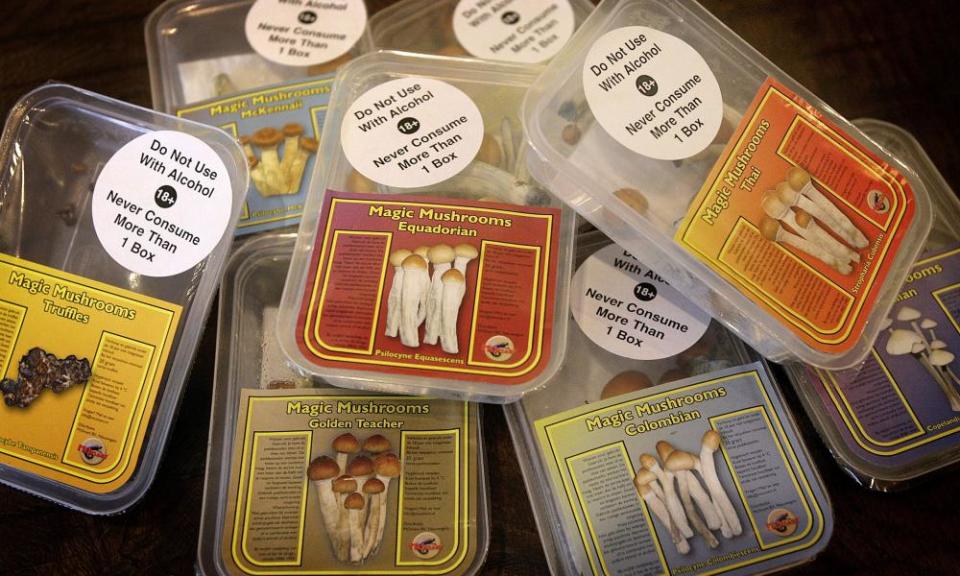People ‘microdosing’ on psychedelics to improve wellbeing during pandemic

The pandemic has seen a shift towards recreational drug users taking tiny doses of psychedelics, such as LSD and magic mushrooms, to improve their wellbeing and mental health, a leading addiction expert has said.
People were microdosing to self-medicate rather than following the trend, popularised in Silicon Valley, of consuming small amounts of psychedelics to enhance creativity, Prof Adam Winstock, the founder and director of the Global Drug Survey, said.
The 2021 survey found that among those respondents who both microdosed and took psychiatric drugs almost half reported reducing or stopping their prescribed medication.
Winstock, a London-based consultant psychiatrist and addiction medicine specialist, said the findings suggested people had been experimenting with microdosing during the pandemic, perhaps due to increased waiting times for mental health services.
The report also found people were experimenting with a wide variety of psychedelics. About a third of those who microdosed with LSD or magic mushrooms (psilocybin) reported also trying other substances, including ecstasy (MDMA), ketamine, a dissociative anaesthetic, and ayahuasca, a strong hallucinogenic plant-cocktail revered by indigenous faith healers.
While a tripping dose of LSD is about 100 micrograms, ambitious tech workers from Silicon Valley have eulogised the effect of taking 10 to 20 micrograms every few days on their creativity and productivity, with people in the UK reporting doing so for similar reasons.
“In the past people were using microdosing for performance enhancement and creativity,” said Winstock. “Now, I think people are shifting towards using microdosing to enhance wellbeing and to address mental health distress.”
Of the fifth of microdosers who said they were taking psychiatric drugs, about a quarter reported they stopped taking their medications altogether and another quarter reduced their intake.
“This, for me, is microdosing shifting into treating mental health,” added Winstock, who is an honorary clinical professor at the Institute of Epidemiology and Health Care, University College London.
More than a fifth of respondents to the survey who had used LSD and magic mushrooms in the last 12 months reported having microdosed either drug during that period.
Three-quarters of them reported no side-effects, while about 10% reported unwanted mental effects and 8% physical effects.
Winstock was cautious about the findings, noting that the majority of research on psychedelics and mental health involved full doses of the drugs.
He said he hoped the survey would encourage mental health services, the psychiatric establishment and policymakers to engage positively with microdosing, adding that if the practice remains illegal vulnerable people could be exploited or accidentally take hallucinogenic and harmful doses.
The largest placebo-controlled trial into psychedelics to date by researchers at Imperial College London found that the mood uplift reported by microdosers might just be the placebo effect.
One of the lead researchers on that study, Dr David Erritzoe, clinical director of the university’s Centre for Psychedelic Research, said he supported further clinical trials into the possible benefits of microdosing.
But he added that the hype around the practice was leading people to report inflated positive effects.
“The problem is that it’s a bit counterculture and from something as cool as Silicon Valley. You have bestselling books by really cool people writing about how their lives have been transformed. And it taps into scepticism about medical expertise and big pharma. All that adds to people’s expectations and a potential placebo effect.”
The 2021 Global Drug Survey, which received responses from more than 32,000 people from more than 20 countries between December 2020 and March 2021, also noted the impact of Covid, with a slight drop in the use of recreational drugs.
While the use of psychedelics had dropped slightly over that period, Winstock said data from the previous six years showed an upward trend in their use.
Many people also reported that they had taken further precautions when taking drugs socially during the pandemic.
Of the 14,000 respondents who reported using cannabis, 42% said they less frequently shared a joint, vape, pipe or bong with other people during the pandemic.
Just under a quarter (24%) said they were more likely to use joints, pipes and bongs prepared only by themselves, while a fifth reported increasing social distancing while using cannabis.
Of the respondents who reported using cocaine, 26% said they were less likely to share a straw or snorter with another person, while a fifth said they were less likely to snort a line racked up by someone else.

 Yahoo Movies
Yahoo Movies 